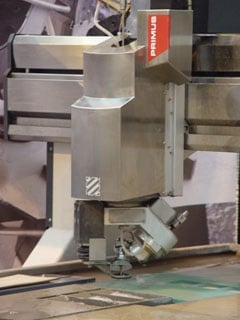Intermac is holding open days at its UK headquarters in Daventry, Northamptonshire, 21-23 January to demonstrate its Primus waterjet cutting. You are invited.
Waterjet cutters have not made their way into many stone processors’ workshops in the UK and Ireland yet but elsewhere in the world they are proving popular. According to Biesse, the Italian company that makes Intermac CNC workcentres for stone processing, its range of Primus waterjet cutters has been the star performer of the past three years worldwide.
Waterjet cutting is ideal for producing intricate patterns in just about any material and because it can cut so accurately with its CNC controls, makes just about perfect inlays, which is its forte for stone.
There were originally some reservations about waterjet cutting of a relatively thick material such as stone because the cut splayed out towards the bottom (it is known as tailback), but that problem has long since been overcome.
Processors have also been reluctant to invest in a machine that costs as much as a CNC workcentre but is not likely to be used as often, especially as they cut too slowly to be used for the general production of worktops. That, though, is also changing as economies of scale and technological developments bring down prices.
Some stone companies have invested in waterjet cutters in order to be able to offer floors with company logos inlaid in them, for example, which can be a profitable expansion of a processor’s portfolio.
Certainly many stone processors find waterjet cutting intriguing enough to want to find out more about it. If you are one of them, you might like to visit the headquarters of Biesse and Intermac in the UK at Daventry, Northamptonshire, between 21 & 23 January, when the company will be demonstrating a Primus 322. If you would like to come along call Chris Ebbage on 01327 300366 (chris.ebbage@biesse.co.uk). You are welcome to bring along a piece of stone of your own up to 200mm thick for the Primus to cut.
The Primus 322 comes in three and five axes versions. The fifth axis is provided by a tilting head, which means mitres can be cut into stone.
All the Intermac and Biesse machines are made at a huge, modern factory at the Biesse headquarters in Pesaro, Italy, which produces more than 450 CNC workcentres and waterjet cutters a year for the stone, glass and wood markets worldwide. And it makes them quickly because customers tend to invest only when they have already secured the job that warrants the investment. It takes a week to make a machine from start to shipping (although before you get too excited you should note the current order to installation lead time is 12 weeks).
As you might expect, Biesse uses the latest in CNC machinery for the production of its own CNC machines. And if you think stone processing workcentres are sophisticated you should see the machines Biesse uses – one of them has a bank of 300 tools. Biesse also believes it was the first company in Italy to buy top-of-the-range Japanese Mazak machines, which it uses to make parts for Intermacs.
To make sure the machines are accurate when they leave the factory the company has spent €800,000 on a machine that measures the precision of its own machining down to five microns. The device is housed in a carefully controlled environment (because a few degrees change in temperature at that level of accuracy would affect the readings).
Biesse owns the company (HSD) that makes its spindles (which are so good that competitors also buy them), while the company that makes the frame parts Cosmec, works exclusively for Biesse.
Biesse also owns Diamut, which makes the diamond tools it recommends for use with its Intermac Master range of workcentres. Lately, Diamut has developed tools especially for working Cosentino’s new material, Dekton (as reported in the previous issue of NSS). There will be a chance to see those tools working in the UK on a Master 33 in the Spring, when Intermac UK plans to have a month demonstrating the new tools. It intends to have a Master permanently installed in its Technical Centre after that so that anyone from the stone industry thinking of buying one can give it a hands-on trial before making a decision.
The Biesse Group in Italy also develops all its own software in-house.
This brings all the vital elements of manufacture and control of the Intermacs under the quality regime of the Group and enables it to implement its own research and development.
Biesse says it only has subsidiaries in countries where the sales warrant it, which is why it has its own business in the UK, which also covers Ireland – and there are now 360 Intermacs installed in the British Isles.
Worldwide, Biesse employs 2,500 people. There are 41 of them working in the UK, including 15 engineers, three of them on front line support. These are the people you talk to when you ’phone up with a problem – and 86% of the time they are the people who solve the problem. Three quarters of the calls that cannot be solved on the ’phone are corrected within 24 hours by the engineers on the road.

